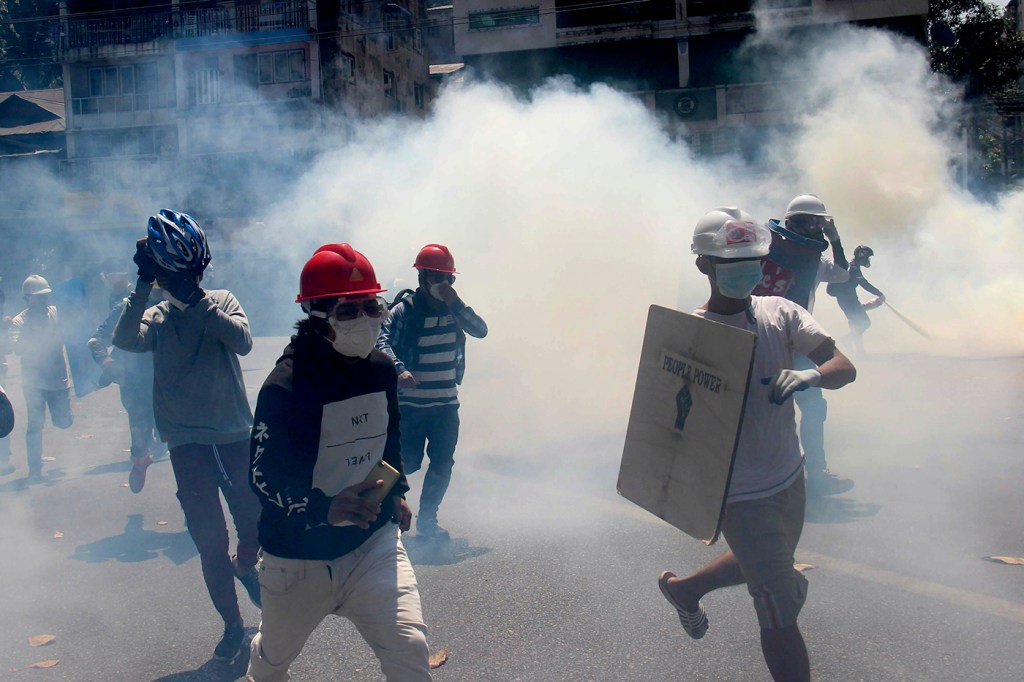Military takeover in Myanmar is a test for Biden’s foreign policy

One of President Biden’s best options to peacefully return Myanmar to a civilian government after last month’s military takeover is to work closely with the leader of the United Nations, according to Northeastern faculty experts.
U.N. Secretary-General António Guterres of Portugal could appoint a representative to play a behind-the-scenes mediation role that may include engaging Australia, one of the leading regional powers, to lure Myanmar back on the path to democracy, but China looms large and Biden’s diplomatic toolbox is limited, faculty add.

Left, Denise Garcia, an associate professor of political science and international affairs. Northeastern file photo. Right, Xuechen Chen, lecturer in politics and international relations at New College of the Humanities at Northeastern in London. Courtesy photo.
“China has the interest to maintain ties with the junta no matter what because China wants to keep its corridor … into the Indian Ocean and use Myanmar’s territory as its commercial lane,” Denise Garcia, a U.S.-based associate professor of political science and international affairs, says of Beijing’s massive infrastructure investment strategy, known as the Belt and Road Initiative.
The United States intends to create a web of democracies around China, and it is more likely that democracies will align with U.S. soft power, Garcia adds. The operational principle for the U.S. is democracy, she adds, and it cares about everyone becoming one.
“China does not,” she points out.
The Feb. 1 coup, Garcia adds, reflects the generals’ desire to continue to dictate the country’s direction. “They are also admittedly envious of the popularity of the ruling party and its success in the latest elections,” she points out.
Myanmar, or Burma, as the U.S. government calls it, has been riled by protests and bouts of civil disobedience since the army seized control. The move had a sense of déjà vu, as the military in 1990 similarly rejected the election results after being roundly defeated at the ballot box. It would be more than two decades before democratic elections returned.
A violent military crackdown last weekend resulted in at least 18 deaths and 30 injured after weeks of largely peaceful demonstrations, according to the United Nations.
UN Secretary-General Guterres condemned the violence. He urged the international community to send a clear signal to the military rulers to respect the results of the election. Popular politician Aung San Suu Kyi and her party won in a landslide in November.
Earlier in her political career as opposition leader, Kyi was awarded the Nobel Peace Prize in 1991 while under house arrest. In 2015, she led her party to victory in the country’s first openly contested election in 25 years. But the once-iconic figure in the Buddhist-majority country has since lost considerable moral standing and clout by allowing the persecution of the Rohingya, a Muslim ethnic minority, Garcia says.
The army cited fraud in overturning November’s campaign and promised a new election, but has not set a date. It has imposed a one-year state of emergency.
No proof of duplicity has materialized so far, says Xuechen Chen, a lecturer in politics and international relations at New College of the Humanities at Northeastern in London, part of the university’s global network. She says that the lopsided electoral tally reflected voters’ strong rejection of the military.
“That’s something we can’t really deny about the election results,” Chen says.
Biden has already imposed sanctions on Myanmar’s military leaders since the army seized power, and a senior adviser signaled that more actions may be coming.
Chen noted the irony of the timing of the coup, coming a few weeks after Biden took the reins of the United States. Myanmar, she points out, was viewed as one of the Obama administration’s more notable pro-democracy foreign policy achievements. Biden was Barack Obama’s vice president when in 2012 Obama became the first U.S. president to visit the country.
Beyond coincidence, “I don’t really feel that the military takeover is really closely related to Biden’s coming to power,” Chen says.
One difference she observed between past protests and the current wave is the role of social media. Citizens have mobilized protests using digital platforms and encrypted messaging apps, she says. Meanwhile, the military recently was banned from Facebook and Instagram, the tech giant announced.
Collectively, the moves will make it challenging for the military regime to deal with pro-democracy activists, unlike in the 1990s when there was little to no telecommunications infrastructure.
But with a more open economy and the proliferation of phones, “it will be very different from the previous protests that we have seen in this country,” Chen says.
For media inquiries, please contact media@northeastern.edu.





